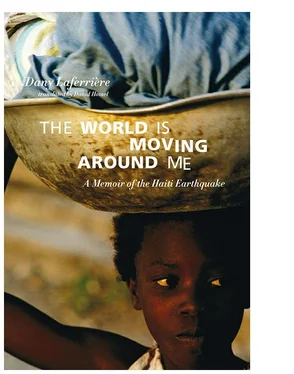Brussels Hotel
By the time I left Tallahassee, I had surrendered to the monster. I got to the Brussels Book Fair. What a reception! They welcomed me with such ceremony — but it was Haiti they were taking into their hearts. I had interviews everywhere. Belgian intellectuals (Yvon Toussaint, Jean-Luc Outers) were deeply moved by the Haitian tragedy. I saw the same thing in the schools. I’d never witnessed such fervor toward a nation. The grade-school students who went to the fair with their teachers asked me about the history of the country instead of just the recent events. They were interested in daily life there. The questions were well thought out and most of them touched on love and death. They had all read Je suis fou de Vava and La fête des morts . Eyes open wide, they asked all kinds of hard and essential questions. Do you still love Vava? Can you love the same person your whole life through? Do people die differently in Haiti? Can you love someone even after death? Whose death: yours or the other person’s? Laughter. A short interlude when I didn’t think of my book. Then I ran back to the hotel room. Frenzy: I was writing non-stop. If that kept up, with no writer’s block, I’d finish the earthquake book in five days, and use the remaining six to correct Notes . The room was well lit. Through the window, I could see the trees gently stirring. Anything that moves still scared me. I dove back into the book. That feeling of reliving everything, moment by moment. I had to make choices to keep from getting lost in the details. I was writing this book as much for myself as for others. Everyone who hadn’t been there. A friend, Ann Gerrard, protected me by telling everyone that I wasn’t available, without giving any explanations. I met up with Alain Mabanckou at the “Échappées africaines” booth. He was in a hurry too. We took a little time to talk. He had been expected in Port-au-Prince on January 13. When the earthquake struck, he was finishing a book illuminated by the presence of his mother: the Pauline Kengué I wrote about in The Return . In that book, Pauline dies in Haiti. Of her, I wrote, “She always said she’d come here so Alain would feel Haitian when the time came.” I felt that fate was awaiting him in Port-au-Prince. Good thing he didn’t make it. He was the first to announce that I was still alive. Our constant correspondence keeps us friends. I woke up early to write, then packed my bag and took a taxi for the station.
The Train
The ride from Brussels to Paris lasts a little over an hour. I decided to use the time to empty out my mind. Rest my spirit. Watch the undulations of the landscape. These lands haven’t known hurricanes or earthquakes for quite a while (but two world wars will do). Nature seems solid here. But I know that all Atlas has to do is shrug his shoulders and everything will tip into horror. I didn’t want those violent images. Can’t I have peace and quiet any more? Extreme fatigue is pushing me into a tunnel of darkness. But I know how to find peace. From deep in childhood, I conjure up my grandmother’s smiling face. Sleep follows. The next thing I know, the train is pulling into the station.
Paris Hotel
I want nothing else but this little book about the earthquake I’m writing. It isn’t long, but it has captured me by stirring up dark emotions I thought were well hidden in my memory. I’m not the kind who cries in public. Big events never make me cry. I get teary-eyed over silly things, like a flower losing its petals in the wind. I went to my favorite district in Paris where there are plenty of bookstores. To my eyes, Paris is the most beautiful city in the world. But it’s a hard place. Don’t try being poor in Paris. I went to that little hotel that dates back to 1890. Everything dates back to another century in Paris. Nothing moves here. It’s the opposite of Port-au-Prince, where everything is moving. Now I have to tell my publisher that he won’t be getting the book he’s expecting, but another one. Meanwhile, he’s been talking up the first one for the last month. He’ll have to get word out to his network. He knows I’m unpredictable, but reliable. He’ll always get a book, even if it’s not the one he was expecting. One book was hiding behind the first. A month ago, I was saying No to publishers who wanted me to write about the earthquake. And it’s still No. I was working on the notes I took in Port-au-Prince while the events were still fresh in my mind and my body. That’s not what I call a book. It was my private life put into words. I agreed to open up a little about what happened so that other people wouldn’t feel alone with their emotions. Now I have to face the music. My publisher is waiting. He’s in a state. He’s pacing the room, phone jammed against his ear. He’s playing publisher, the way that I’m playing writer. We both have cracks in our structures, and we don’t know when the cracks will bring down the whole construction. So we have to act fast. The machine can break down at any time. And I say that without pathos. Just as well, since this is a book that could be written only in a state of emergency. At the hotel, I go downstairs and tell the guy at the desk that I don’t need my room cleaned for the next few days. A surprised look. I end up explaining that I’m finishing a book that I have to give my publisher in the very near future. The guy smiles broadly. One of the few cities in the world where the writer is sacred. They start sending tea to my room. They even offer to filter my phone calls. “Give me the names, sir, of the two or three people you wish to speak to. For the others, I’ll take a message.” I write with a cup of tea. The way Oscar Wilde did on his last trip to Paris. He stayed in his room, reading Balzac and drinking tea. The only luxury that counted for him was being in Paris. I get up early and write. As long as I’m writing, nothing moves. Writing keeps things from breaking down. But you can’t spend your life writing, knowing that everything will collapse as soon as you stop. You’d like to stay in this dream world. Alice will go back through the looking glass. In reality, people don’t live in hotels in Paris or anywhere else; they sleep in tents. They have to fight for something to eat, and they watch the sky with apprehension. Although that’s no reason to sleep under a bridge. There’s no sense imitating other people’s poverty. It’s better to act so that one day they will sleep in clean sheets and spend their days in idle thoughts that sweeten life. This is the last day. In the room next to mine, a couple is making love. On that music, I will finish the book.
About Author and Translator

DANY LAFERRIÈRE was born in Port-au-Prince, Haiti, in 1953. He is the author of fourteen novels, including I Am a Japanese Writer, Heading South, and the award-winning How to Make Love to a Negro without Getting Tired. Laferrière is the recipient of numerous literary awards, including the Prix Carbet des Lycéens, the Prix Médicis, and the Governor General’s Literary Award. He lives in Montreal.
DAVID HOMEL, born and raised in Chicago, is a Governor General Literary Award-winning translator and writer who lives in Montreal. His recent books include the translations of The Last Genet: A Writer in Revolt and The Inverted Gaze (both Arsenal Pulp) and his own novel Midway (Cormorant).













